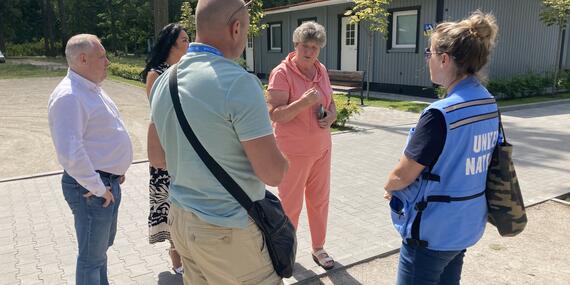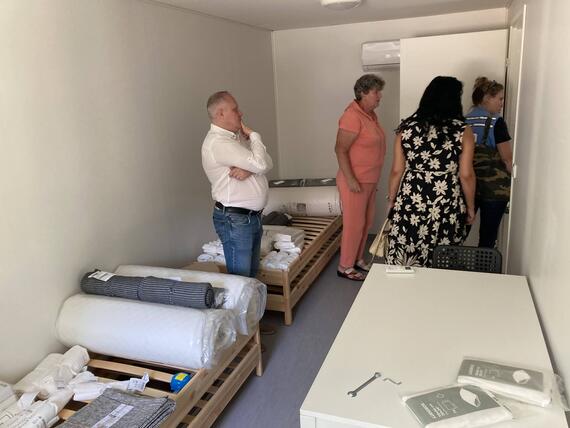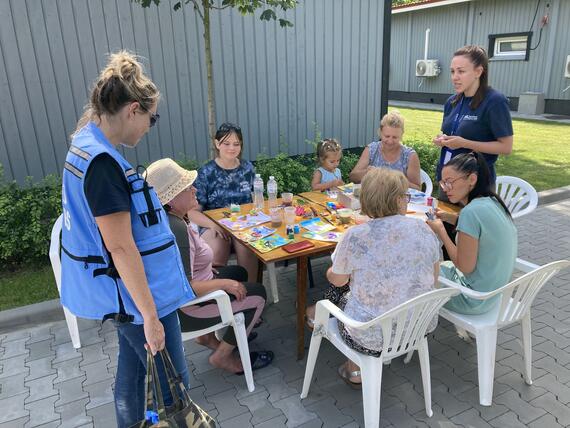At 66, Olha leads a new town for Ukraine's displaced people

By Yaroslav Berezovskyi, OCHA Ukraine
In March 2022, Olha Romovych and her family lost their homes during intense fighting in Irpin Town, Kyivska Oblast. Several multistorey residential buildings were also destroyed. The full-scale invasion of Ukraine began in February 2022, and Kyivska Oblast was among the regions most affected by the Russian Federation’s initial attacks.
“It was heartbreaking to see our apartments, where we had lived all our lives, destroyed beyond repair,” Olha told the OCHA Ukraine team, who visited the town in late August 2023.
After being on the move for more than a year, staying with friends and family, Olha was given a place to call home: a new unit in a modular town in Irpin. Funded by the Government of Finland, the town was constructed on the grounds of a community resort that had become moribund. Olha was also appointed Camp Manager of the town.

New homes
Each unit has two sleeping areas, a separate kitchen and a bathroom. Multiple units are connected to construct each module. Each unit can accommodate up to six people and is equipped nicely with IKEA furnishings. The modular town currently hosts nearly 140 residents, including 30 children and 35 older people. Most residents are from Irpin, but some are from Kherson City in southern Ukraine — a region still exposed to repeated attacks. The units are provided free of charge to residents, as are utilities, including Wi-Fi.
“In May 2023, local authorities offered my family a new home – this cosy apartment in a brand-new modular town constructed on the outskirts of Irpin,” said Olha. “I got a new lease of life when the Mayor of Irpin offered me the Camp Manager position after I settled there.”
Facing myriad challenges, including a year of displacement and a recent triumph over cancer, Olha weighed her options heavily before accepting the Camp Manager position at 66 years old.
“At this age, and after all we've been through, it was far from an easy decision,” she admitted.

Renewed sense of purpose
But she discovered the role offered more than just administrative duties – it provided her with a renewed sense of purpose.
“Each morning begins with a walk through our modular community,” she explained. “I visit my new neighbours to identify any issues that need attention. It's not just a job; it's a commitment to the well-being of everyone here.”
Her responsibilities extend to serving as a vital bridge between residents, local authorities and humanitarian partners. The role has given Olha a sense of normality and community-building in the face of adversity.
"I also act as a liaison with municipal services, ensuring that essential needs are met promptly. We even have our own band here,” she said with a smile. “We recently invited humanitarian partners and the Mayor of Irpin to join us in celebrating Saviour's Day [19 August, which is also World Humanitarian Day]. Moments like these – where we can find joy amid hardship – give me incredible strength and faith in a brighter future.”
Other modular towns are operational in Irpin, and additional units are under construction. Although more expensive than other shelter options, the units are a response modality that provide stability and community for displaced people, and are popular with local authorities and displaced people. However, the generosity of donor Governments is often required to support increasing costs.
According to the World Bank’s Rapid Damage and Needs Assessment, Ukraine’s housing sector suffered damages of more than US$50 billion between February 2022 and February 2023 due to the war, impacting more than 1.4 million residential units. Nearly 90 per cent of the affected properties were multistorey residential buildings, affecting around 3.5 million people. According to data reported by humanitarian actors, UN agencies and NGO partners have reached at least 1.7 million people with shelter and non-food items so far this year.
